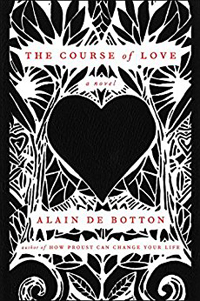 Alain de Botton, The Course of Love: A Novel (New York: Simon and Schuster, 2016), 225pp.
Alain de Botton, The Course of Love: A Novel (New York: Simon and Schuster, 2016), 225pp.
Rabih Khan was fifteen when he experienced the first pangs of romantic infatuation. Even as an adult many years later, his crystal clear memory of the girl at the hotel swimming pool was emotionally resonant. And then, quick as a flash, she was gone forever.
Romantic love is a powerful force. It's an assumed narrative in our western culture. Mutual attraction is the main way that we meet a life mate and then try to build a marriage. But in life as in this novel, that's a setup for failure. By the end of the book, fifteen years and two children into his marriage with Kirsten, Rabih has learned that trying to sustain a solid marriage based upon romantic love is "a recipe for disaster."
De Botton explores what it's like to be married for the long haul, after the blast of romantic love is long gone. We know how love starts, but we've given little thought about how it grows and endures. Rabih and Kirsten married when they were about thirty, but then what? Like almost every marriage, they will experience what de Botton calls "the real love story." That is, "they will suffer, they will frequently worry about money, they will have a girl first, then a boy, one of them will have an affair, there will be passages of boredom, they'll sometimes want to murder one another and on a few occasions to kill themselves."
We would do far better to appreciate how normal it is to find it difficult to build a healthy marriage. That's because marriage is "a hopeful, generous, infinitely kind gamble taken by two people who don't yet know who they are or who the other might be, binding themselves to a future they cannot conceive of and have carefully omitted to investigate."
No person or love is perfect. No one can possibly meet all the needs of another. Romantic love, in fact, can be very selfish, for it's mainly a quest to find rather than to give love. And an enduring love will only happen when we learn "the transcendence of oneself for the sake of another" through virtues like sympathy, kindness, and compassion. Which is to say, "love is a skill rather than an enthusiasm." And after all the hard work, there's a genuine sense of gratitude that in this imperfect world, good enough is good enough.
Alain de Botton (b. 1969) is a Swiss-born British author who's written some fifteen books, most notably the best seller How Proust Can Change Your Life (1997), although this is his first novel in twenty years. My only disappointment with this book is that, now in my sixties, de Botton leaves his characters Rabih and Kirsten when they are merely in their forties. They have even more lessons and skills to learn.


